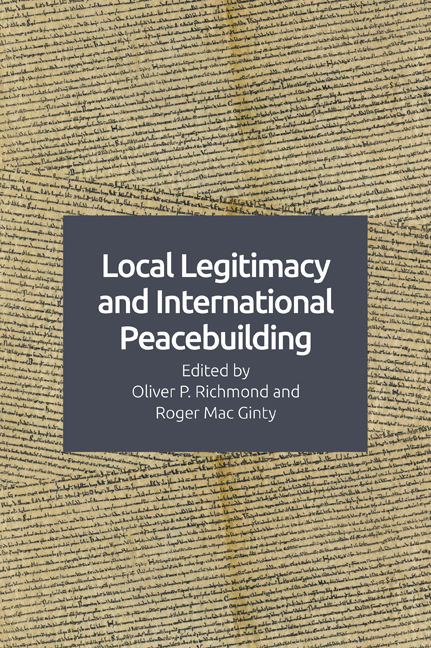Book contents
- Frontmatter
- Contents
- Contributors
- Foreword: The Riddle of Legitimacy
- Introduction: Legitimacy and Peace in the Age of Intervention
- One The Hybridization of Legitimacy in Processes of Peace Formation: the Bougainville Case
- Two International Intervention and Relational Legitimacy
- Three From a Divisive Peace Agreement to a Legitimate Peace in Colombia
- Four Banners, Billy Clubs and Boomerangs: Leveraging and Counter-Leveraging Legitimacy in the Occupied Palestinian Territory
- Five Peacebuilding as a Self-Legitimising System: The Case of Bosnia-Herzegovina
- Six ‘We Are There at Their Invitation’: Struggles for Legitimacy during the US Coalition Invasion–Occupation of Iraq
- Seven Inclusion and Performance as Sources of Legitimacy – the UN Mediation on Syria
- Eight Agonisation to Re-Legitimise the Postcolonial, Post-Conflict Somaliland
- Nine Third Party Legitimacy and International Mediation: Peacemaking through Pan-Africanism in Sudan
- Ten Post-War Legitimacy: A Framework on Relational Agency in Peacebuilding
- Eleven Legitimacy in Lebanon
- Conclusion: Peacebuilding and Legitimacy: Some Concluding Thoughts
- Index
Five - Peacebuilding as a Self-Legitimising System: The Case of Bosnia-Herzegovina
Published online by Cambridge University Press: 17 November 2020
- Frontmatter
- Contents
- Contributors
- Foreword: The Riddle of Legitimacy
- Introduction: Legitimacy and Peace in the Age of Intervention
- One The Hybridization of Legitimacy in Processes of Peace Formation: the Bougainville Case
- Two International Intervention and Relational Legitimacy
- Three From a Divisive Peace Agreement to a Legitimate Peace in Colombia
- Four Banners, Billy Clubs and Boomerangs: Leveraging and Counter-Leveraging Legitimacy in the Occupied Palestinian Territory
- Five Peacebuilding as a Self-Legitimising System: The Case of Bosnia-Herzegovina
- Six ‘We Are There at Their Invitation’: Struggles for Legitimacy during the US Coalition Invasion–Occupation of Iraq
- Seven Inclusion and Performance as Sources of Legitimacy – the UN Mediation on Syria
- Eight Agonisation to Re-Legitimise the Postcolonial, Post-Conflict Somaliland
- Nine Third Party Legitimacy and International Mediation: Peacemaking through Pan-Africanism in Sudan
- Ten Post-War Legitimacy: A Framework on Relational Agency in Peacebuilding
- Eleven Legitimacy in Lebanon
- Conclusion: Peacebuilding and Legitimacy: Some Concluding Thoughts
- Index
Summary
Introduction
The question of the legitimacy of peacebuilding is a fairly recent one given that the concept of ‘peacebuilding’ itself has long been assumed to be apolitical and technical in nature. Richmond suggests that peace has been assumed to be extraordinarily legitimate by nature, arguing that ‘almost inevitably thinking on peace has […] followed the Platonic notion of an “ideal form,” which is partly why the concept is so often imbued with such mystical legitimacy.’
At the same time, the increasingly prominent acknowledgment in both policy circles and academia that peace is in fact ‘political’ has opened up the Pandora's box of legitimacy concerns around the mechanisms through which and ends to which peacebuilding is being conducted. The more critical literature on peace has therefore increasingly emphasised the power inherent in the policy projects that peacebuilding devises. Academic debates have, at least to a small extent, started to reflect on the need of peacebuilding to be legitimate, not only from the perspective of the interveners and their host societies, but also the societies that ‘receive’ peacebuilding.There have been debates around the tensions between local and international legitimacy. There certainly also have been attempts to evaluate the success and thus, implicitly, the legitimacy of peacebuilding, for instance through its (in)ability to respond to the needs and interests of its recipients. But even the more recent debates on ‘hybrid legitimacy’ or everyday legitimacy have tended to look at the manifestations of legitimacy as a relational phenomenon between local and international actors rather than the ways in which legitimacy discourses are constructed by the peacebuilding community itself and with reference to itself.
Given the self-referential nature of peace operations, the degree to which peacebuilding legitimacy has been tuned to the societies in which peace is being built has been rather limited in practice, as this chapter will argue. It will show with the example of the post-war peacebuilding process in Bosnia-Herzegovina (BiH) that instead, peacebuilding has been constructed by its architects as a self-perpetuating system within which legitimacy is assessed by the same networks that are at the very core of designing peacebuilding policies.
- Type
- Chapter
- Information
- Local Legitimacy and International Peace Intervention , pp. 116 - 136Publisher: Edinburgh University PressPrint publication year: 2020

